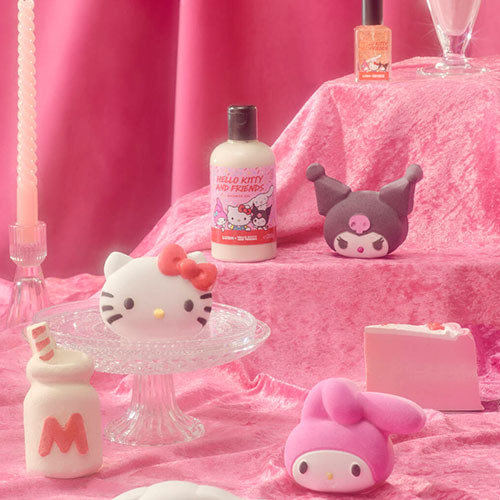Start Licensing’s Ian Downes spies a number of good news stories for Licensing PLC this week, from Dunelm and Merlin through to Squires garden centres.
It is always encouraging to see licensing stories make the mainstream media, even more so when they are success stories. I spotted two this week.
The first was reported in The Times business section last Friday. Under a headline reading ‘Successful children’s range gives Dunelm extra bounce’ the story outlined how a ‘successful children’s range’ developed with the Natural History Museum helped drive sales more than two thirds higher at Dunelm in the first three months of the year. Its ceo Nick Wilkinson was quoted as saying that the Natural History Museum collaboration will be extended after ‘pleasing’ numbers and customer enthusiasm. The article was accompanied by a large colour photo featuring the product in a lovely shot set within the Museum.
In the same paper there was also a story about theme park operator Merlin and this mentioned how ‘a cast of characters from Bear Grylls to Peppa Pig combined to help kickstart the recovery at the world’s second biggest visitor attractions operator’. The story went on to name check other partnerships with ‘famous consumer brands or names’ such as Gangsta Granny, Mythica and LEGO. Both these stories are good news stories for Licensing PLC and should give us encouragement that licensing works. It is good to see the industry talked about in positive terms within the business pages and these are two good case studies to point to when challenged about the effectiveness of licensing. Indeed, they may well be the sort of stories that might encourage other companies to consider using licensing in their businesses.
 Stories in national newspapers is one way of gauging the impact of licensing and licensed characters. Another less structured one is how characters pop up in pop culture settings such as street art. I am a frequent visitor to street art sites including Waterloo’s Leake Street Arches. I always look out for characters in the arches – on the walls, not among the visitors or artists.
Stories in national newspapers is one way of gauging the impact of licensing and licensed characters. Another less structured one is how characters pop up in pop culture settings such as street art. I am a frequent visitor to street art sites including Waterloo’s Leake Street Arches. I always look out for characters in the arches – on the walls, not among the visitors or artists.
This week I saw Garfield and Sonic the Hedgehog. Garfield is a frequent visitor to Leake Street. I am guessing that street artists feature characters that they grew up with or were influenced by. Not very scientific, but an interesting off grid way of gauging a character’s pop culture appeal. It is important to draw a line between artworks that artists have chosen to paint themselves as opposed to paid for installations. In most cases the art at Leake Street is in the former category. Other characters I have seen recently include Tweety Pie and Scooby Doo.
It is always interesting to see licensing popping up in places or occasions you don’t expect, whether that’s in a Waterloo tunnel or a retailer. On a visit to Pets At Home I noticed that it was selling Simon’s Cat pin badges at the till point. These were being sold in aid of the charity Cats Protection. I thought this was a good match of character, retailer and charity. Pets At Home is a relatively licensing free zone – there are some character-based aquariums and aquarium accessories but not much else to report licensing wise. A campaign like the Simon’s Cat one might well be one that could encourage them to consider using licensing in other ways in-store.
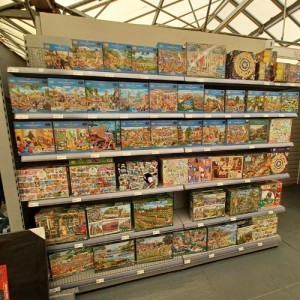 I also visited a branch of Squires Garden Centres this week. In contrast to Pets At Home, Squires specifically and garden centres in particular are big supporters of licensed ranges and they work with a lot of licensed product suppliers. It is also interesting to see how certain suppliers have cultivated this market sector and hold a strong hand within it.
I also visited a branch of Squires Garden Centres this week. In contrast to Pets At Home, Squires specifically and garden centres in particular are big supporters of licensed ranges and they work with a lot of licensed product suppliers. It is also interesting to see how certain suppliers have cultivated this market sector and hold a strong hand within it.
A great example is Gibson’s with its puzzle range. It has maintained a strong position and presence in the category for some time now. The distinctive branding stands out and it tops up the non-licensed range with a few licensed products including the likes of The Original Stormtrooper.
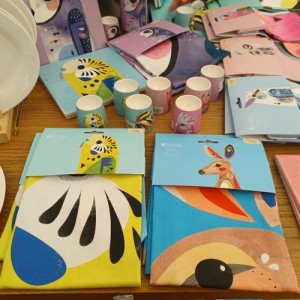 While Gibsons has been in-store for some time, I did notice a few new licensed ranges. One of these was a range from gift supplier Maxwell Williams featuring designs from Pete Cromer. The collection was badged as designed in Australia and the subject matter certainly reflected that with the likes of koalas, budgerigars and kangaroos featuring. Pete Cromer’s art was very bright and colourful. It really stood out in a garden centre environment. I have assumed it is a licensed range… I didn’t get the chance to investigate it fully.
While Gibsons has been in-store for some time, I did notice a few new licensed ranges. One of these was a range from gift supplier Maxwell Williams featuring designs from Pete Cromer. The collection was badged as designed in Australia and the subject matter certainly reflected that with the likes of koalas, budgerigars and kangaroos featuring. Pete Cromer’s art was very bright and colourful. It really stood out in a garden centre environment. I have assumed it is a licensed range… I didn’t get the chance to investigate it fully.
Other well displayed ranges in Squires licensing wise are William Morris, Sara Miller and Cath Kidston.
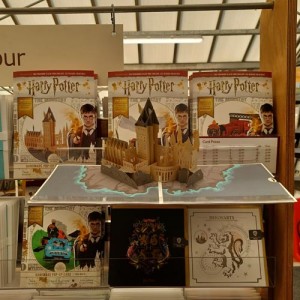 Greeting cards are also a staple of garden centres. It was good to see so many licensed ranges featuring in Squires’ card offer with Cardology’s Harry Potter products catching the eye in particular, not least as their pop up cards were well displayed and consumers could see what they were getting. Display is often the element of product selling that is overlooked or neglected.
Greeting cards are also a staple of garden centres. It was good to see so many licensed ranges featuring in Squires’ card offer with Cardology’s Harry Potter products catching the eye in particular, not least as their pop up cards were well displayed and consumers could see what they were getting. Display is often the element of product selling that is overlooked or neglected.
It was good to see that Cardology and Squires recognised that the Harry Potter product needed to be shown to best effect to have the best chance of succeeding.
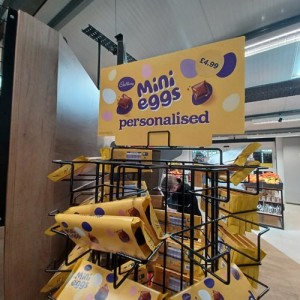 I also visited the Food Hall at Squires. Food sales including gifting formats seems to be an increasingly important part of the garden centre offer. Given I visited over the Easter weekend, it wasn’t a surprise to see Easter products dominating shelves.
I also visited the Food Hall at Squires. Food sales including gifting formats seems to be an increasingly important part of the garden centre offer. Given I visited over the Easter weekend, it wasn’t a surprise to see Easter products dominating shelves.
One range in particular that stood out was a spinner featuring Cadbury’s Mini Egg chocolate bars. These were personalised products with a range of first names coupled with more general names such as Mum, Dad and Brother. I am not sure if this is a licensed venture, but it is a good example of the continuing trends towards more personalised gifts in retail and the use of trusted brand names within this category.
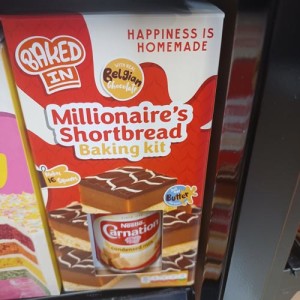 It was also interesting to see how food companies, particularly in the composite gifting and product market, are using well known brands to add value to their products. Baked In specialises in developing bake at home kits. One of its products on sale was a Millionaire’s Shortbread Baking Kit. To add value and appeal to this kit it has included a tin of Nestle’s Carnation Milk. I am sure it has bought this product in and Nestle is happy to see the product used in this context, but it certainly helps the Baked In product stand out in a crowded market.
It was also interesting to see how food companies, particularly in the composite gifting and product market, are using well known brands to add value to their products. Baked In specialises in developing bake at home kits. One of its products on sale was a Millionaire’s Shortbread Baking Kit. To add value and appeal to this kit it has included a tin of Nestle’s Carnation Milk. I am sure it has bought this product in and Nestle is happy to see the product used in this context, but it certainly helps the Baked In product stand out in a crowded market.
It may also be a useful way for Nestle to test the market and gauge the market for composite gifting for Carnation. Who knows, we may see a full range of Carnation Milk food gifting products in the coming months. It is certainly a brand that is well established, trusted and recognised. All good ingredients for licensing.
Ian Downes runs Start Licensing, an independent brand licensing agency. His Twitter handle is @startlicensing – he would welcome your suggestions for what to look out for.



























